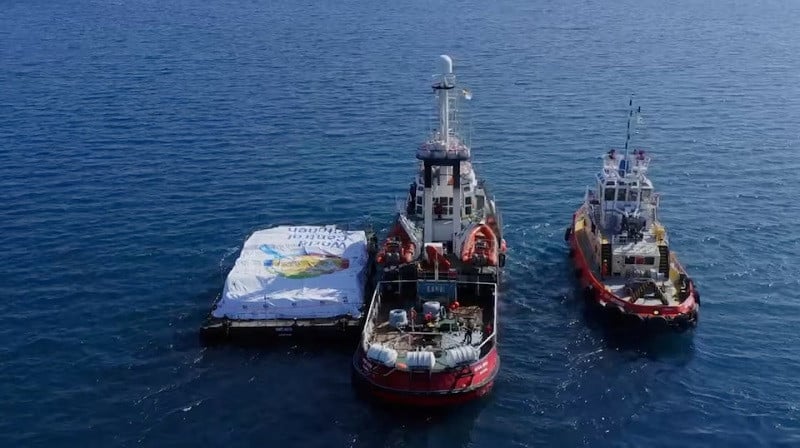CAIRO/LARNACA: As part of a pilot operation to provide a maritime route for the delivery of goods to a population that humanitarian agencies claim is on the verge of hunger, a ship carrying 200 tonnes of food for Gaza departed Cyprus on Tuesday.

Witnesses saw the humanitarian vessel Open Arms departing the port of Larnaca, Cyprus, pulling a barge that included protein, rice, and flour. World Central Kitchen (WCK), a US-based organisation, organised the expedition with primary funding from the United Arab Emirates.
The trip to Gaza takes roughly fifteen hours, although it might take up to two days if a hefty tow barge is used. Gaza is located 320 km (just over 200 miles) to the northwest of Cyprus.
The General Frank S. Besson, a US military vessel, was reportedly on its way to deliver humanitarian aid to Gaza via sea.
The focus has switched to alternate means including air and sea drops, with humanitarian agencies reporting that delivery into Gaza have been hampered by security and bureaucratic roadblocks since the conflict began on October 7 with even Israel’s friends requesting easier access to the territory.
Majed Al-Ansari, a spokesman for Qatar’s foreign ministry, stated on Tuesday that talks aimed at a truce between Israel and Hamas, the organisation in charge of Gaza, were not nearing a conclusion.
For several weeks, Washington expressed its expectation that a truce agreement would be reached in time for the start of the Ramadan holy month this week. However, negotiations have not resulted in any agreement between the parties on how to stop hostilities, release captives, or send aid.
The EU member state closest to the war, Cyprus, spent months preparing for Tuesday’s naval supply mission. It is already witnessing an increase in migrant inflows from Lebanon and is closely monitoring the knock-on effects of the turmoil in the Middle East. On Monday, more than four hundred individuals arrived on fishing boats.
Due to Gaza’s lack of port infrastructure, WCK said that it was constructing a landing jetty using debris from demolished structures as a separate project from US President Joe Biden’s announcement last week on the construction of a temporary pier.
WCK founder Jose Andres stated on X that the jetty’s construction was “well underway” and included a photo of bulldozers that appeared to be levelling land near the sea.
A second vessel would depart in the coming days, according to Juan Camilo Jimenez, WCK Activation Manager, who spoke with Reuters.
The speaker mentioned a WCK team that has been present in Gaza for several months. “Part of our calculation is the port will be ready when we arrive there and more importantly we have a team there to support the distribution of this aid,” the speaker added.
While praising attempts to provide aid by air and water, the UN humanitarian office stated that these measures would not be sufficient. As long as Israel keeps the majority of land crossings entirely closed, aid organisations claim that such attempts will only be able to offer restricted support.
Spokesman Jens Laerke stated, “It’s not a replacement for the overland transport of food and other emergency aid into Gaza.” “It cannot make up for that.”
Given that it permits supplies to pass through two crossings at the southern boundary of the enclave, Israel claims it is not to responsible for Gaza’s hunger. Aid organisations claim that is insufficient to deliver necessary supplies, especially to the effectively cut-off northern portion of the pulverised enclave.
“Dire” circumstances
According to UN estimates, 25% of Gaza’s population is currently in danger of hunger.
“We are starving in two ways: there is a shortage of food, and the food that is available is unimaginably expensive,” stated Yamen, a father of four, whose family sought refuge in the central Gaza Strip’s Deir Al-Balah.
Most of Gaza’s 2.3 million residents have been forced to flee their homes due to the conflict; over half of them are currently jammed into the southern city of Rafah, mostly in improvised tents.
As those who are extremely hungry rush to get food, charity deliveries have seen tumultuous scenes and tragic accidents.
Palestinian health officials said on Tuesday that during throngs waiting for relief vehicles at Gaza City’s Kuwait Square, Israeli gunfire resulted in nine Palestinian deaths and several injuries. Israel refrained from commenting on the incident right away.
More than 100 Palestinians lost their lives in one incident last month while waiting in queue for assistance. Israel denied responsibility and said the victims had been trampled, but Gaza health officials blamed Israeli fire for the killings.
“Bombing gatherings of hungry people has become a daily routine practiced by the occupation and seen by the international community on screens,” the Gaza Health Ministry’s spokesperson, Ashraf Al-Qidra, stated on Tuesday.
“Every person living in the northern part of Gaza will perish from hunger. There is very little aid. For the price of a lunch, you might die for sure. Aid the northern people. Don’t let malnutrition, bombing, and illness claim them as prey.”
In an onslaught on Israel on October 7, fighters from Hamas, the organisation that controls Gaza, killed 1,200 people and kidnapped 253 more, according to Israeli estimates.
Authorities in Gaza report that Israel’s military campaign of retaliation has resulted in at least 31,184 Palestinian deaths and 72,889 injuries.
Israel has stated that it is only interested in a short-term truce to release prisoners, and Hamas has stated that it will only release captives as part of an agreement to stop the war permanently. Ceasefire talks have so far failed to produce a resolution.
Along with Egypt and the US, Qatar serves as a mediator. On Tuesday, it announced that it was attempting to create a long-term ceasefire as opposed to a temporary one.
Al-Ansari continued during a news conference in Doha, “We are not close to a Gaza ceasefire deal but remain hopeful.”










































